Episode #54: What it’s Like to Raise a Medically Fragile Child with CVID
Show Notes: In this video, we sit down with Stacey Short, a mother who has raised a medically fragile child and found herself losing her sense of self as she took on the responsibility of caring for her son with Common Variable Immune Deficiency (CVID). Stacey shares her experiences, insights, and struggles as a parent of a medically fragile child, including how she coped with the stress, uncertainty, and emotional toll of caring for a child with complex medical needs. Stacey now uses her experiences to help other women who may be going through similar struggles. She specializes in helping women aged 35 and above who secretly hate life a little too often and have become the person they never thought they would turn into. These women are having trouble recognizing their reflections, and now find themselves yelling at, resenting, and avoiding their loved ones. In this interview, Stacey offers valuable advice and support for parents of medically fragile children, as well as for anyone who may be struggling with their own identity and sense of self. She shares practical tips on how to maintain self-care, prioritize your own well-being, and seek out support systems that can help you through challenging times. Her story is one of resilience, compassion, and hope, and her insights will be valuable to anyone who is navigating the challenges of caregiving and parenting. Interested in working with Stacey? Book a free discovery call and find out if her coaching program is a good fit. Be sure to mention you heard about it on the Water Prairie Chronicles for a discount! https://calendly.com/afewshortminutes Stacey loves to connect! Find her at: Facebook: https://www.facebook.com/coachstaceyshort Instagram: https://www.instagram.com/afewshortminutes_coaching_/ LinkedIn: https://www.linkedin.com/in/afewshortminutes/ TikTok: https://www.tiktok.com/@stacey_coaches Connect with Us: https://linktr.ee/waterprairie Support this channel: https://www.buymeacoffee.com/waterprairie Music Used: “LazyDay” by Audionautix is licensed under a Creative Commons Attribution 4.0 license. https://creativecommons.org/licenses/by/4.0/ Artist: http://audionautix.com/
The Water Prairie Chronicles Podcast airs new episodes every Friday at Noon EST!
Find the full directory at waterprairie.com/listen.
A Parent’s Honest Account About CVID
Show Notes:
In this video, we sit down with Stacey Short, a mother who has raised a medically fragile child and found herself losing her sense of self as she took on the responsibility of caring for her son with Common Variable Immune Deficiency (CVID). Stacey shares her experiences, insights, and struggles as a parent of a medically fragile child, including how she coped with the stress, uncertainty, and emotional toll of caring for a child with complex medical needs.
Stacey now uses her experiences to help other women who may be going through similar struggles. She specializes in helping women aged 35 and above who secretly hate life a little too often and have become the person they never thought they would turn into. These women are having trouble recognizing their reflections, and now find themselves yelling at, resenting, and avoiding their loved ones.
In this interview, Stacey offers valuable advice and support for parents of medically fragile children, as well as for anyone who may be struggling with their own identity and sense of self. She shares practical tips on how to maintain self-care, prioritize your own well-being, and seek out support systems that can help you through challenging times. Her story is one of resilience, compassion, and hope, and her insights will be valuable to anyone who is navigating the challenges of caregiving and parenting.
Interested in working with Stacey? Book a free discovery call and find out if her coaching program is a good fit. Be sure to mention you heard about it on the Water Prairie Chronicles for a discount!
https://calendly.com/afewshortminutes
Stacey loves to connect! Find her at:
- Facebook: https://www.facebook.com/coachstaceyshort
- Instagram: https://www.instagram.com/afewshortminutes_coaching_/
- LinkedIn: https://www.linkedin.com/in/afewshortminutes/
- TikTok: https://www.tiktok.com/@stacey_coaches
Connect with Us: https://linktr.ee/waterprairie
Support this channel: https://www.buymeacoffee.com/waterprairie
Music Used: “LazyDay” by Audionautix is licensed under a Creative Commons Attribution 4.0 license. https://creativecommons.org/licenses/by/4.0/ Artist: http://audionautix.com/
Meet Today’s Guest:
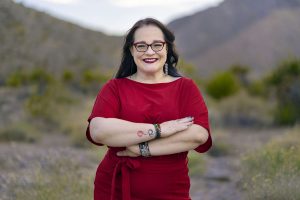 Stacey Short is a compassionate individual who grew up as an Air Force BRAT, constantly seeking to help others live a better life. With a B.A. in Psychology from the University of Oklahoma, Stacey’s journey took a turn when she discovered that her newborn son was medically fragile in 2005. She returned to the service industry to provide better care for his medical needs. In 2016, Stacey experienced the tragic loss of her baby brother to suicide, which plunged her into a dark place where she struggled to live.
Stacey Short is a compassionate individual who grew up as an Air Force BRAT, constantly seeking to help others live a better life. With a B.A. in Psychology from the University of Oklahoma, Stacey’s journey took a turn when she discovered that her newborn son was medically fragile in 2005. She returned to the service industry to provide better care for his medical needs. In 2016, Stacey experienced the tragic loss of her baby brother to suicide, which plunged her into a dark place where she struggled to live.
With the help of health professionals and medication, Stacey was able to crawl out of the depths and, in 2020, she decided to fully embrace her calling once again. She pursued certifications in health, life, and clarity, and now helps women who have lost themselves in the roles of life and do not recognize themselves in the mirror.
Today, Stacey is the proud mother of two teen boys and some spoiled pups. She understands that the process of living a purposeful and fulfilling life is ongoing, and she continues to strive to make a difference in the lives of others.
Episode #54: What it’s Like to Raise a Medically Fragile Child with CVID
A Parent’s Honest Account About CVID
(Recorded March 2,, 2023)
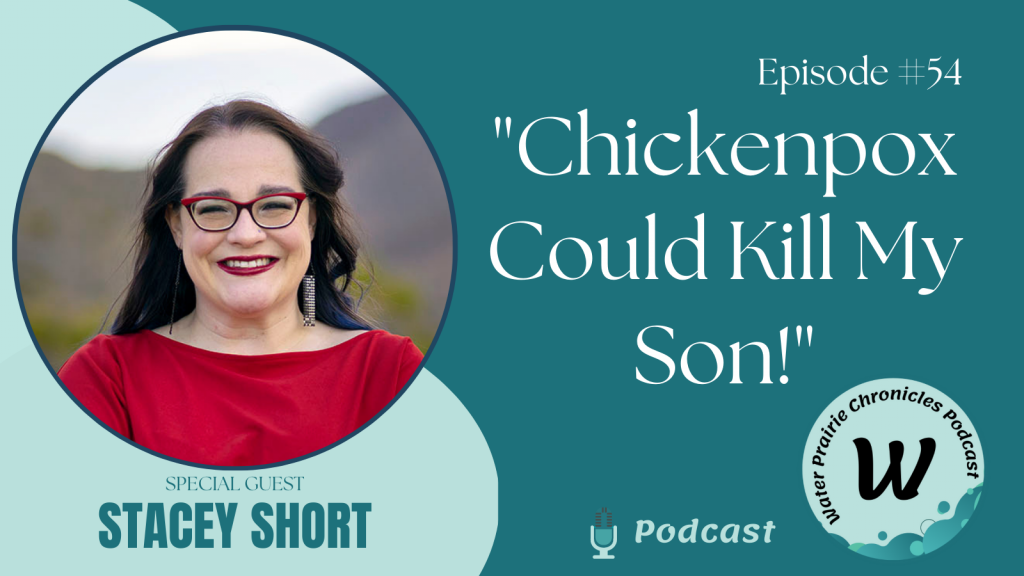
Chickenpox could kill my child. So when we vaccinated my youngest against the varicella, um, we had to do it in two parts because it’s a live specimen. It’s a weakened specimen. But it’s a live specimen. So we had to watch my youngest for 30 days. 30 days for any kind of symptom that he was going to pop one chicken pock.
Because that’s normal with a varicella thing. If he started running a fever, we were to immediately separate houses. Not just room to room, but houses. But what am I supposed to do with that? How am I supposed to do that? Where am I supposed to go? You know, and it’s just those unexpected stressors.
Talk about, you know, we always talk about, we talk about a lot now lately, thankfully, the mental load of motherhood. Um, It really needs to be a more expanded conversation. It needs to be a more. Uh, prolific conversation, a more upfront conversation. Um, and then when you add on the mental load of a mother with a medically fragile child.
Where am I supposed to go if my young and then, and then I’d have to be, I’d have to choose which kid to go with. Because if I separate houses, I can’t go back to the other one because of exposure.
I mean, Sophie’s choice.
So now you have a sick child,
Truly Sophie’s choice.
Do you stay with the sick child or you do you stay with the one who is healthy but needs more protection?
Needs his mother.
Yeah. They both need mom at that point. You know?
Absolutely. And I literally cannot be in two places at once. And as much as my ex-husband was trying to help there’s just,
Well, and there’s something too with mother-son relationships too. It’s, it’s different. And there’s a strong bond there. And you’ve got two boys, so
It is,
yeah.
Mm-hmm. .
All right. Again, we’re getting into stuff that we need to talk about.
We’ll just continue talking and then you, you can record
I’m gonna do a quick intro. Let’s just, cuz we’re stopped now. So let’s go ahead and do this now.
Sure.
Um, all right. So welcome to the Water Prairie Chronicles. Our guest today is Stacey Short. I met Stacey through a Facebook group that we both belong to and she is the proud mom of two teenage boys.
And she’s gonna be sharing with us a little bit about her experience of having a child who is medically fragile and how she’s learned to work through some of the stress that she’s faced in her experiences. Um, Stacey, what else do you wanna add to that? Cuz that’s just a little tip of the iceberg of who you are.
Yeah, right. Um, I think that’s what happens when you’ve gathered 46 years on this planet . Um, I am the mom of two teen boys. They are 17 and 15. Um, I am a single mom. I’ve been divorced since 2014. I do co-parent, their dad is seven miles from here. Um, and, uh, I lost myself completely, um, in trying to keep my oldest son, his name is Bryce, trying to keep him alive.
And when I rediscovered myself again through therapy, um, and a lot of introspection, a lot of boundary setting, a lot of self-esteem work, a lot of, a lot of, a lot of, um, I really wanted to go and help women. who have lost themselves in the roles, uh, the demanding roles that they play in their life. Um, I wanted to help them rediscover themselves.

I wanted to help them quiet those negative voices. I wanted to help them tap into their inner wisdom, their inner godd-ess, and, and bring that higher self forward and live in the present and not live the same day over and over and over and over again, which is what I did for about 15 years. Um, and so now I am a transformational self-love coach, um, that specializes in women who secretly hate life a little too much, a little too often.
And that’s kind of taboo. We really don’t talk about that, um, as a whole. But when you really have a, a medically fragile child or a, a child that, um, just as, as a, as a little bit more challenge and takes a little bit more of attention, um, it’s even easier to lose yourself because then not only are you a mom, but now you’re a caretaker and that is a whole different kind of role.
And, um, so I wanna help women navigate that faster. And I really wanna be the coach that I wish I had had all those years ago. And instead of living the same day for 15 years, um, maybe had honored myself a little bit more instead of trying to numb all of the pain that I was trying to avoid.
So you can tell by listening to her intro that she’s got a lot to add to us here.
So, um, so we’re gonna dig into some questions in a bit. But first of all, during this season we’ve been asking our guests to share 2 Truths and a Lie about themselves. And we’re challenging our listeners to go on to Instagram, Twitter, or in the comments of the YouTube channel, and leave your guesses of which one you think are, which of the two you think are true and which one you think is the lie.
And a week after we post this, you can check back on Instagram and see what the answer is to that. So, um, so Stacey, what are your three statements that you’re going to give us for them to guess which are true and which is the lie?
Sure. Um, the first one is I am the absolute, uh, definition of a Sagittarius. Uh, the second one is I am, um, completely healed and lived my life perfectly.
And the third one is, and I have lived in multiple states, uh, anywhere between Alaska to Germany.
Wow.
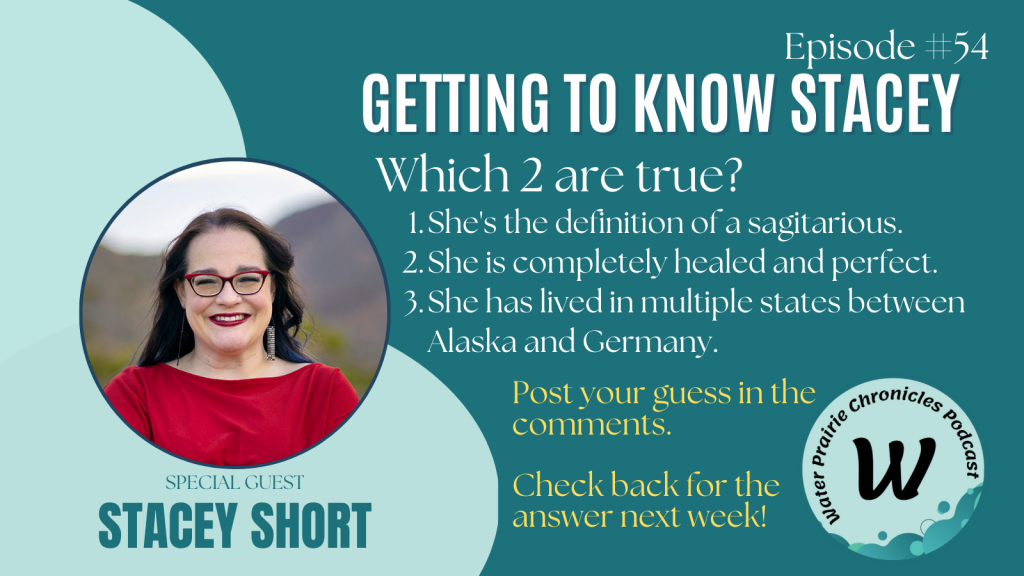
All right. This is your cue. Take a pause on this one. Go answer what you think it is and come right back to finish the rest of listening to this one. So, um, so Stacey, you have two boys. You said they’re 15 and 17, right?
And, um, and so Bryce is your oldest, is that correct?
Bryce is my oldest.
Make sure I have, have all of my details. Wait, I, I’m sorry. I was talking there. What is, what is your youngest son’s name?
Garrett. His name is Garrett.
Garrett. So Bryce and Garrett.
Mm-hmm. .
And, um, so my kids are a little bit older. Not much.
They’re 20 and 22. So we’re, we’re just a few steps ahead of you on, on that, on, on the other side of the high school graduation line. from you . Um, so for Bryce, um, he’s, he’s part of what we’ll be talking about with this. And is he okay with us discussing this?
Yeah, he, he is, um, I think he’s come to a place of, if my story can help, then why not share it?
Good for him. Good for him.
There is no embarrassment about his condition. There is no shame. Um, honestly, he doesn’t know life differently like he was born with this. Yeah. And so, um, people always kind of go, gosh, I, I don’t know how he deals with this. If you were, if you never had a TV in your, in your house, would you miss it?No. You wouldn’t know. And so he doesn’t know any differently. Um, I hurt for him because his high school experience was not my high school experience.
Um, I hurt for him because I had a job at 16 and, and we don’t even know what that looks like for him. Um, you know, just all those kinds of like little marker, those teenage markers that I really enjoyed and hated at the same time.
He really just hasn’t had that experience. Right. Um, and so I hurt for him, but he doesn’t know what he’s missing cuz he doesn’t know to miss it. And so that’s a kind of a blessing there. Um, but he talks about his condition openly.
Okay, good.
Um, he’s not embarrassed by it. He’s not, there’s no shame. Um, this is nothing that he did to himself. It’s just a weird genetic fluke. Um, and I hope. My hope for him one day is that he does something with this, just like you were sharing about your daughter earlier. Um, I hope that he at least speaks about what it’s like to live with Common Variable Immunodeficiency. Um, I think, I think that would be really empowering for him one day.
So, so you just gave us the name of what it is. So it’s Common Variable Immunodeficiency.
Immunodeficiency,
okay.
Mm-hmm. .
And is this, is it, is that the full name of it? Does it have syndrome or anything as part of it, or, I’ve never heard of it. Obviously .
Um, yeah, it’s, he’s a rare bird. He’s a rare bird. Um, when you consider rates in autism are like one in 50 for boys.
Yeah. Which for some reason those rates are high. They’re are. The ratio is lower for, for boys than girls. Um, maybe it’s just a misdiagnosis or an underdiagnosis. Kind of like now we’re figuring out with ADHD in women. Right. Uh, late diagnosis here. Yep. So, um,
he is about one in 1 million, one and a half million.
Yeah.
Um, so I live in Las Vegas and there are 2 million people here. And I know of two people in this city besides Bryce.
Oh, wow.
That live with CVID. But their CVID combination is different than his.
Okay.
So your immune system is made up of IgA, IgE, IgG and IgM generally. Um, the IgA and the IgE are generally part of like the allergy part of your immune system.
Um, IgA has dual function, but generally part of your, so if you’ve got like a wheat allergy, you’re aller allergic to dogs, it is actually your immune system kicking in. And, and, um, so that side of him is fine as far as him, his immune system goes, what isn’t okay is the bacteria and the virus fighting side of his immune system.
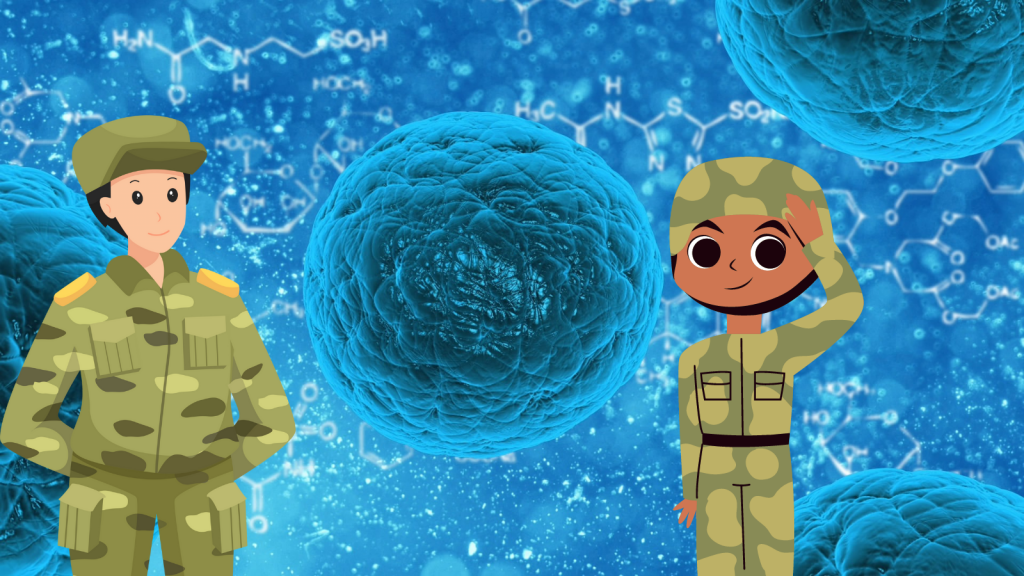
So he was, um, so the IgG are basically the, the soldiers. So if you go back to high school biology, right, you’ve got, um, something that attaches to the foreign in invaders in your body, and then white blood cells, the, the, the mi the macrophages come and they eat it up, right? . But how do they know to attach to those things?
Well, they’ve got like kind of generals, right? And that’s the IgM and the generals say, oh, that’s foreign. Go attach to it. So then the white blood cells can come and eat it. Well, he doesn’t really make generals and he doesn’t really make soldiers.
Okay.
So there’s no, um, signal that these things shouldn’t be here.
And even if the, what little immune system is in him does signal, there are not a lot of soldiers to go attached to it, to tell the white blood cells, Hey, here, you want to eat this guy? So, um, like for him, he doesn’t run a fever.
Okay.
He doesn’t run a fever. And that’s, that’s the first sign
His body doesn’t know, right.
His body doesn’t know. It just allows things to come in, set up, shop, hang out, invite the friends, like, yeah. Yeah. And so he’s had a lot of strange illnesses in his short. 17 and a half years on this earth. Um, the weirdest one that almost took his life, um, what is called, uh, it was called pseudomonas pneumonia.
And, um, it just came in and set up shop and hung out because his body couldn’t detect that it was there.
So as you’re explaining that, um, I have multiple sclerosis and I’m thinking the whole time, so he doesn’t have the, the immune system to fight. I have an immune system that decides to fight me instead
Correct.
And that’s the difference between you having, um, an autoimmune disease system disorder, whatever you. Syndrome. He has a primary immune deficiency. Also, not to be confused with an acquired immune deficiency. HIV type stuff. Right. And so his is truly a genetic fluke where his body, just some gene activated.
Um, my, my family is usually autoimmune. My aunt has ms, my mom has Hashimotos thyroiditis. So super familiar with those.
Um, but Bryce has gotta be, you know, the, uh, uh, the original one with, um, a primary immune deficiency.
Interesting. Yeah. Cuz I, like I said, I’ve never, never heard of this before. So this is, this is new for me.
yeah.
So the, so it’s affecting his, his health risk, how does it affect his daily life?
Yeah, his daily life. Um, , his body fights to sustain. To sustain,
Okay.
Let alone grow.
Okay.
So he never hit that growth spurt that other children hit, especially boys, right?
Yeah.
They always, they usually have this just massive growth.
He never had that. Um, he is tired a lot, a lot, um, because his body is just fighting to, to sustain.
Um, and so a lot of lethargy, a lot of low muscle tone. Um, a lot of just things of, of that nature. Um, when he does get sick, like, um, he actually had a raging ear infection last week raging. Um, normally.
If, if you don’t have a medically fragile child like Bryce, the doctors will say, um, oh, we’ll just wait it out. Cuz ear infections, they don’t really treat as much any longer. Right. They just kind of let it write, write its course. But for Bryce, you can’t, because it’ll stick around, it’ll stay, it’ll do damage, it’ll go into something else, it’ll mutate.
I mean, it’s terrible. And so I took him, or his dad took him to the doctor on a Saturday and, and an urgent care kind of call, but only to his primary. We don’t do normal urgent care clinics.
They don’t know what to do with him, . They don’t know what to do with him. Um, and so we went to Hi. He went to his doctor, and his doctor put him on some big, big sier antibiotics and some eardrops.

Um, and usually they say, oh, 24 hours and, and the antibiotics have kicked in and you should start feeling better. So that was on Saturday. It wasn’t until Thursday that he was sort of out of pain. .
And then he was still sleeping 13 and 14 hours a day, and then still being tired, still wanting to take naps.
Um, and so he doesn’t go to a traditional high school Right. Because of reasons like that.
Oh, yeah.
Uh, he goes to school Wednesdays and Thursdays from 11:45 to 3:30. That’s it. Okay. Um, I, yeah. And, and also the exposure into,
Well, that’s, that’s what I was thinking,
that level of Yeah. Thousand kids in a school. I’m just asking for trouble at that point.
Yeah. One sneeze near him. Yeah.
Especially with Corona. Especially with COVID. Yeah. So we’ve been isolated for three a long time now, and unfortunately my youngest, we don’t talk about this, the side effects or this bystanders. Bystanders. Right. And so, like my, my youngest poor Garrett, he gets the brunt of this too.
because he can’t , he can’t go to school. Um, Bryce’s Immunologist has explicitly advised against it because if Garrett goes to school and is exposed to a thousand kids, then we might as well go to school and be exposed to a thousand kids because Garrett’s gonna bring it home and, and my son is not protected.
Um, and so Garrett’s had to homeschool for these last, even when they went back to full in person, he couldn’t go.
And so he’s isolated because of it. And I just, I feel terribly for, for him because he’s got like this, he’s missing that peer-to-peer relationship, those social relationships that I just absolutely loved in high school.
Right? I still have real best friends from high school 30 years later and, and my kids missed out on that. And that really makes me sad for them. It really makes me sad for them. It does.
I think a lot of our kids, um, their tho those that were in school since Covid, so the last few years, especially at the high school level, their, their path is their path.
But it’s not what you and I had just because the world changed during all that time. And on top of that, now you also have, whether it was COVID or not, would the boys have been able to go to high school?
Yeah. Um, questionable at best. Yeah. Even if Covid wasn’t exac around, that would’ve been questionable at best.
Um, I think that Garrett definitely could have gone, but, but Bryce has always missed a lot of days in school.
Um, a lot of days. And so we, I mean, he did go to, he went to middle elementary. He did go to middle.
I mean, he, he is, he has been in school. Um, but he missed like 40, 40 days is that’s, that’s kind of average for him, for missing that much school.
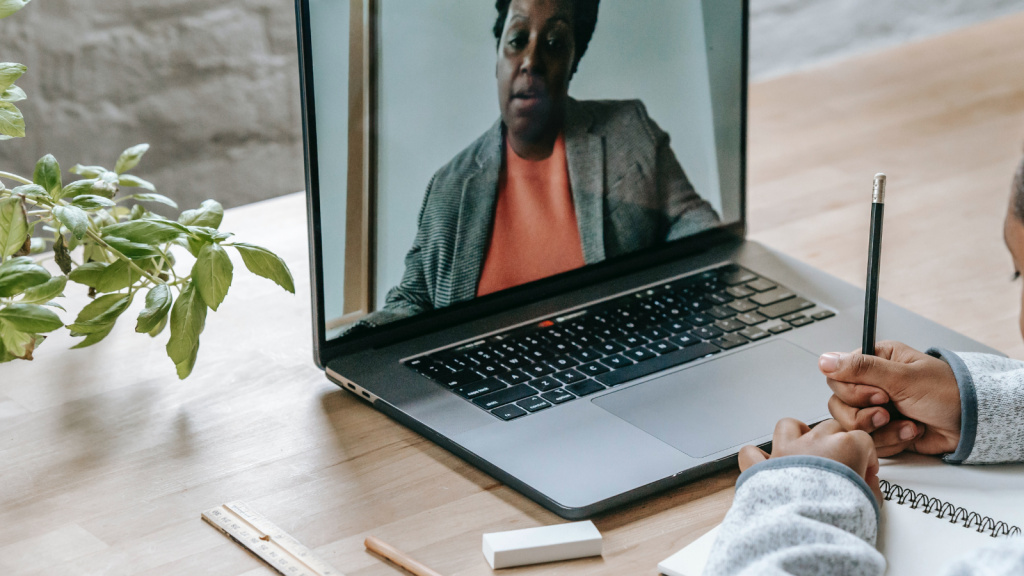
And so, um, well the school did provide a tutor, uh, once a, for every eight hours that he missed, he got an hour, hour of, uh, special education tutoring. Um, and so we did take advantage of those school, um, programs. But it’s not enough. It’s not enough. And it doesn’t make up for the peer-to-peer relationships ever.
Right, right.
Ever. So, um, even if Covid hadn’t been around, his high school life would’ve been stunted, just like his middle school and elementary schools lives were not full and robust like mine was.
It’s, it’s, it’s interesting watching them grow up , you know,
Well, and then if you, you know, if you talk about ADHD, one of my children has rejection sensitive dysphoria, part of it.
Yeah.
And so that really does affect how he manages expectations, how he manages feedback, how he manages. ,
Yeah.
Life. Um, and so that adds a whole other component to conflict resolution. Um, and I don’t really know. That is out of my scope. That is out of my scope. As, as, as scoped as I am, I’m not scoped there. So,
But you’re supposed to be proficient at all of this
Ah, believe me, I tell myself that. All day, every day, or I used to. So yeah. That perfectionistic pattern is, uh, that was an ugly one to break, believe me. Yeah, absolutely.
But this is why having these conversations are important though, because, you know, we’re chatting right now, but someone listening to this is going to hopefully realize that they don’t have to have all the answers either. You know, none of us have all these answers.
Oh God. No. Nobody does. Nobody does. But ask questions. Please ask questions.
You are empowered to ask questions. I I want you to a, ask questions. I want you to advocate for yourself. I want you to use your words. I didn’t. And I was miserable because I thought I had to have all the answers. And I was the go-to girl. I, I got it.
No problem. I’ll handle it. Give it to me, blah, blah, blah, blah, blah, blah, blah, blah, blah. You know, if you want something done, do it yourself or want something done. Right. Do it yourself. No, That is a perfectionistic pattern that does nobody service and we need to let it go. Um, but I also didn’t feel empowered to ask questions because when I brought Bryce to the doctors at three months of age and said he’s only sleeping 45 minutes at a time.
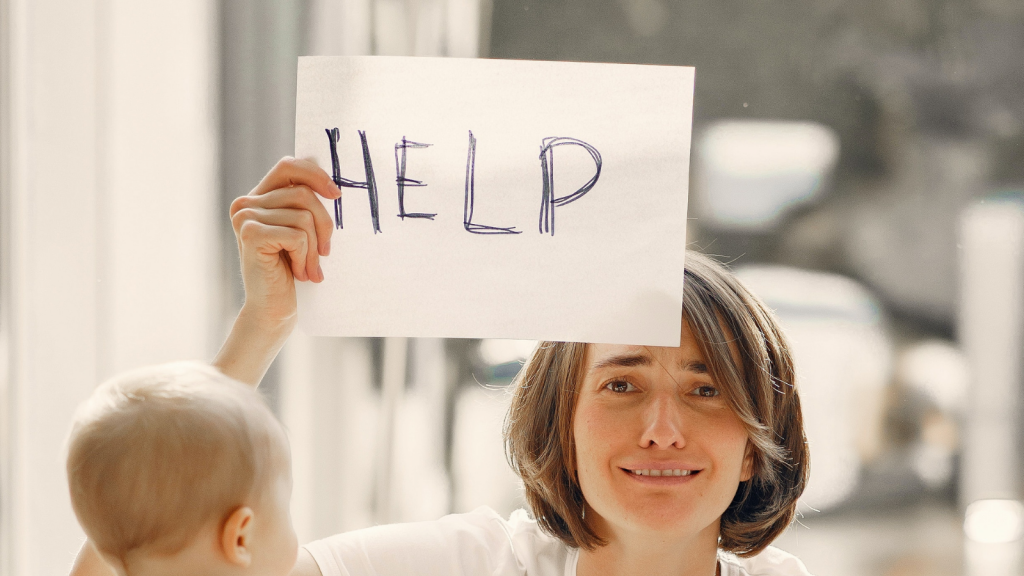
And I am ragged and I have to hold him in order for him to sleep. and, you know, non co-sleeping parents don’t advocate for that. Co-sleeping parents do. I don’t care. I was just tired. I was tired.
Yeah. And his doctors dismissed me because I was a first time mom. And so they thought I was just being neurotic.
They didn’t trust that my instincts were kicking in. Um, they didn’t trust that I was, I’m the oldest grandchild, children of 12, or the oldest child of three, or that I started babysitting kids in my neighborhood at 10. None of that mattered to the medical professionals that I was taking him to. Mm-hmm. , in fact, at like six months of age.
I took him to the pediatrician again because he had strep throat and an ear infection again.
At, at six months of age. At six months. Okay. That’s supposed to be impossible.
Okay. That’s supposed to be impossible is what they tell you. He was like, the first year he was alive, he had 12 positive strep tests and 24 appointments for ear infections alone.
Just for those two reasons alone, there were months that we were at a doctor’s office, an urgent care, an ER, something for weeks on end, Saturday and Sunday included. So, um, anyway, I was living in this small town in Oklahoma, which is where my parents are from. I’m, and um, I took him to his established pediatrician and I said, I’m watching his six to nine month clothes get bigger on him.
and I don’t understand why. Do something. And what his pediatrician told me, I will never forget these words. My mom was in there with me, is she patted me on my hand and said, oh, Stacey, white middle class children under doctor’s care just don’t die in this day and age.
I’ve never felt so dismissed in my life. And that was the beginning of not using my voice because why would I?
Clearly I was overreacting. Clearly. It took him throwing up so violently that it came out of his tear ducts. For her in the office in front of her three months later to go. Oh, okay.
And at by that time I was so sick and tired of being dismissed and watching my kid die. Literally. Yeah. Um, that I said, you are out of your scope. You are in over your head. We need to be in a children’s hospital. I don’t care if I have to drive Kansas City, St. Louis, Dallas, I don’t care, but we’re going and we’re going today.
Yeah. Good for you.
And she said, well, there’s one an hour away, but I don’t have privileges. And I said, I don’t care. , I don’t care.
Um, and she did honor that and she did call ahead so we didn’t have to wait in the ER and all of that stuff.
Um, so I am grateful to her for that. And we were there four hours before a cardiothoracic surgeon came in and said, I think I know what’s wrong with him. (Misdiagnosis number one.)
Um, but if I put him on my operating table today, he will die.
And I had been screaming for months that something was wrong with him. Screaming.

And I was just dismissed. Dismissed. I watched them put an IV in his head because his veins were so sick.
That they couldn’t keep an IV in him to just give him hydration. Let alone anything else. And so we had been there maybe six hours before they had put a central line in and been and fed his heart TPN directly because I was losing him.
I was losing him. He was dying, and, um, we came out of that hospital stay. Um, they went in and they did a fundo placation, which is when they basically tie a knot in the top of the stomach.
They flipped the stomach over itself. They installed a feeding tube, um, directly into his stomach. And, um, he had py um, some mild pyloric stenosis, which is a thickening of the bottom of the stomach so it doesn’t empty into the intestines like it should.
Um, which was causing his projectile vomiting. Um, however, they completely missed the immune deficiency and it wasn’t until he was 22 months of age.
Oh wow.
Um, and I almost lost him again before he was diagnosed with CVID.
What did they think? The doctor that said he couldn’t put him on the operating table, what did he think it was?
He thought it was, um, py pyloric stenosis.
And that, the fundo, um, valve, the valve at the top of the stomach was not closing properly. That’s why you think about when the babies were little, right? And when they started sitting up about six months of age, that that valve, that sphincter actually naturally tightens. So they stop spitting up as much. If you, if you remember that back.
He didn’t. Um, and then the pyloric stenosis, because the buildup of the pressure not emptying would actually cause the projectile vomiting. And that’s why at his worst, he literally vomited through his tear ducts, which is
So alarming. I can’t, that’s, that’s horror story. That is, you know, that’s like exorcist level crap,
Um, and you never wanna see that out of a tiny baby, let alone your own tiny baby. Um, . And so that’s what they thought was wrong with him.
But, uh, that wasn’t, I mean it maybe may the pyloric stenosis. Yes. Um, but no, truly what was wrong with him is he had no immune system and he was sick all the time.
And instead of running a fever, cuz he had no immune system to fight anything producing a fever, he was throwing up instead.
And so when he starts throwing up, even now at 17, I’m like, uh oh you’re going downhill. That’s my first clue.
Well, you know, you know, you know what the clues are
Now, now, yeah. It’s amazing how untreated illnesses that we take, kind of like for granted, right? Like daily I, childhood illnesses, whatever. They can do a lot of damage.
They can do a lot of damage. And, um, Bryce’s lungs are scarred to this day because of the amount of, um, pneumonia and bronchitis.That were, that was allowed to come in, set up, shop and hang out.
Because there were no fevers. There were no, there was nothing, uh, signaling that he was ill. Other than a, than throwing up. And at that young of age, they just go, oh, it’s just acid reflux. It’s just regurgitation. It’s just, oh, you need to slow his feeds down.
Because his stomach isn’t emptying it. No. He was sick. He was sick. And the second time I almost lost him is because we’d had him on multiple courses of antibiotics due to multiple infections. And he got C.. Diff so badly that his bowels stopped moving.
And he almost became septic. So this hospital stay was three weeks. I was six months pregnant with my youngest. I was so much under stress that my OB said, your child has stopped growing in utero.
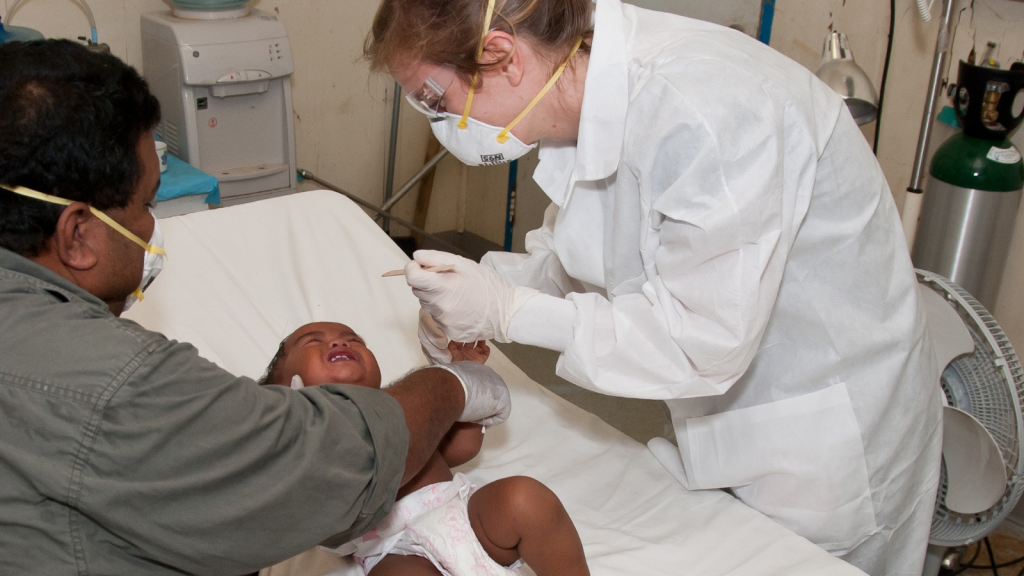
And you need to stop, otherwise, I’m putting you on bedrest. How? How am I supposed to do that when my kid is in the, the, the hospital here? Um, and so that hospital stay, we went in for ilias of the bowels.
Then we found out it was C diff. Um, then the attending didn’t accuse me directly.
Oh no.
But because she could not replicate these vomiting sessions that my mother and I were reporting, she put in a CNA into our room 24 hours a day. And that CNA documented every time I touched my kid. Because what the insinuation is, is that I was Factitious disorder by proxy.
Munchhausen’s by proxy is right pretty much how we all know of it if you’re old school. Um, and if it wasn’t for a CNA telling me that, I never would’ve known that that was the in insinuation. So I’m very thankful for that woman, for using her voice because she knew I wasn’t.
But that’s, that’s what it ended up being. So they were more focused on me than they were on treating my child for the first week that we were there. And then the labs started coming back. Um, they, they blamed the C diff on me because I was advocating for him to being overmedicated by, uh,
It was more illnesses, antibiotics and all. Right. Right.
Correct. Right. Um, and he was, he was working out, part of his CVID is that he gets clammy easily. And so the tape around his IVs were loosening. And because he was 18 months, 19 months, 20 months old, the IVs were working out, working out, working out. Well, after the fourth IV in a week, I said, absolutely not, no more put a PICC line in.
Oh, well that was it. Because now I’m demanding medical intervention for my child.
Well, it takes three sticks to get an IV in this kid and the, and then it’s only lasting like a day, a day and a half.
How is this extreme medical intervention that I am demand? Like I don’t understand that.
Please make that make sense. And um, so then they, they did x-rays of his lungs, um, and nothing showed, but he was still like, they could hear issues breathing,
And so they did a CAT scan and in the CAT scan his lungs were opaque because he had pseudomonas pneumonia.
Which is a pneumonia only AIDS patients get, COPD patients get, cancer patients, oncology patients get, it’s not normal for an, an almost two year old to have pseudomonas. And that was the first clue. , that was the first clue that they paid attention to. But if you go back and you look at his medical records, which are like,
I’m sure
You know, thousands of pages, um, you can see somebody drew drew blood prior and that his IgG levels were low, low, low.
Almost nonexistent. But no, nobody ever paid attention and followed up on it until he was 22 months old when we finally got the diagnosis, finally.
Um, and he was two years old when we got his first port, because if he’s sick, his veins are sick.
That’s why they were shredding and rolling and blowing.
And yet they wanted to persecute me for asking for a PICC line. And, and I just wonder how many children have died because they didn’t have a extroverted parent. Yeah. Me, me and I, and I think that’s just terrible.
And so now, if I can use my voice to help other parents speak up, advocate, who cares?
If you don’t know, your voice is shaking. Trust your intuition. You know your baby better than anybody. You do. And if something’s off, something is off, it is. And, and use your voice. Um.
We say this a lot in these interviews. A lot of, a lot of my parents that I’ve interviewed have come to the same thing that you’ve said is that, you know, it’s, you’ve gotta trust your gut as, as a parent of a child, you know, the only wrong thing is not to say anything, because if you think there’s something, let the doctor be right and you be wrong, but say something because there’s a reason that you’re questioning this.
Absolutely. And you see your child 24 hours a day, you know more. than anyone else sees.
How, okay, so how did you juggle those early years?
Um, I didn’t, I didn’t do it well. I did it at the expense of myself.
Truly, I did it at the expense of my marriage. I did it at the expense of my friendships. Um, I had no boundaries. I had no, I didn’t know how to say no.
I didn’t know how to ask for help. I took on everything and anything that anybody would ask me to. I worked 50 hours a week on top of it. Um, my mom did come and move in with us because we couldn’t take Bryce to, uh, daycare with that kind of diagnoses. Um, cuz again, chickenpox can kill him,
Even to this day, chickenpox could kill him.

Um, we started immediately on immunoglobulin infusions, which costs $30,000 a month. Um, a nurse comes in, it’s a six hour process. The older he gets, the longer it will get because it is very hard on the kidneys. It is about 10,000 people in a bag. And, and I, a small IV bag, not even the, like, the big ones, but the half ones, it’s about 10,000 people in that product.
So he gets a great, uh, cross section of vaccinations, natural immunities, blah, blah, blah, blah, blah.
But because your blood refreshes every 28 days it only sticks in his body for about a month.
And so this will be a continuous process for the rest of his life. Um, and so in those first few years, you’re trying to navigate any and all of that, and you’ve got this kind of specialist and that kind of specialist.
And there was one point in time that we had 14 medical specialists.
At one time. 14. And I, I know I was saying earlier that I didn’t know how to ask for help, but I also felt like I could not.
Because none of the doctors talk to each other. None of ’em. There’s not a system they don’t share.
There’s not an email. They don’t pick up the phone. They don’t even text message. So guess who gets to be the conduit?
I have to remember it all. I have to articulate it all. I have to, uh, regurgitate it all appropriately in order for him to get the proper medical care. So I learned to speak doctor, which was a detriment when I was being accused of fictitious disorder.
Oh, right.
Because I was speaking medical.
Also, I have a degree in psychology, so they didn’t like that either. . Um, I could, I can’t. Um, all of that didn’t save me though, because I grew up as a people pleaser and a codependent, and so I took it all on and then some, and, um, I lost every ounce of who I knew I was beforehand.
Every ounce. I put on weight fast, I was numbing. I was eating to numb. I was drinking to numb. Um, . I had to work a swing shift cuz my husband worked morning. So there was always some apparent home.
Um, and so the lack of sleep, just cuz you come home doesn’t mean everybody is asleep. So I was going to ask, when did you sleep?
You know, that’s, my sleep was very broken for many, many, many, many years. Cause Bryce was on a feeding pump and when the line would get kinked, it would alarm. Okay. How do you get a three year old not to turn over at night? You don’t. Or it would disconnect and it would soak his whole bed.
So then he would wake up wet, sticky, you know, gotta love those 3:30 showers because there’s formula all over.
Um, or he’d get sick and he’d throw up. Like, I, I didn’t sleep for years and even when I did start to sleep, I slept very lightly.
Because I was always listening for him. And so it. Uh, I still sleep lightly to this day. Just not as badly.
Oh, I’m sure.
Um, yeah. Definite sleep disorder, , definite sleep disorder, , all the, all those nights in the hospital, like, oh gosh. Yeah. Forget it. It was bad. It was really bad. Um, so I, I literally was held together by sheer stubbornness. Nothing healthy. Nothing healthy at all. Sheer stubbornness
And the will to have my child live. That was it. Um, but it cost me myself and it cost my marriage eventually. Me, not Bryce me, right. Because I was so lost and I was so unhappy and I was so, I was looking externally for validation and love and affection and solace and support and.
And my, my ex-husband just couldn’t give it to me at that level because I was demanding it from outside and not doing anything internally at all. At all. I didn’t know how. And so, um, I was demanding of people things that they couldn’t give.
Did you eventually find some, some supports?
Um, there are support systems out there, there are support groups out there, and what they did help me do is advocate better for my child, um, ask the right kind of questions and stuff.
Knowing what you know now, yeah. Looking back, what would you do differently than what you did do?
Gosh. Um, I would get into therapy immediately.
Immediately. Therapy, coaching, something, some sort of mental health thing. Support group. Fine. But a led; a guided support group.

By a mental health professional. Don’t just get on a message board. Cause that’s what I did. I got on a, on a, a message board, you know, of, uh, a Immune Deficiency Foundation, IDF. Um, but then it’s all the parents kind of with each other. There’s no overseeing professional there, guiding the conversation or, or allowing support or whatever.
There’s nobody guiding it. And so we just all kind of together. Well, me being me, I took it all on. So I would’ve gotten into some sort of mental health supported therapy. Um, not just into a random messaging group, uh, uh, full of parents. Um, I didn’t get into therapy until eight and a half years ago, almost nine years ago.
If you’re advising a young parent now, at what point in their journey would you recommend that they look for that counselor? Or?
Today. Today.
From the beginning? Okay.
Today, whatever day it is for you, wherever you are in your process, today’s the day.
Okay. So before you feel like you need it, um, get it started. .
Oh yeah. Because the time when you decide, well, like when you figure out like, uh, maybe I need, it’s, it’s way past the need.
It’s way past the need. Um, yeah. I wish I had had the foresight or somebody had recommended to me. Um, in all of the ER, urgent care doctors visits, I wish somebody had said, how are you taking care of yourself? Mm-hmm. that was never asked. Never. Not once, never did any medical professionals say, this must be a lot for you. How are you supporting yourself?
Never a question. Never a question.
I wonder if that’s any different now than it was.
I don’t know.
You know, I mean, it hasn’t been that many years, but it’s been long enough.
It was 15 years ago,
because I’m thinking the last, the last just physical that I went in for.
They had a list of questions and that was the types of questions they were asking. You know, like, like do you Yeah. You know, who, how many supports do you have? Like, you know, naming a couple of them, things like that. Um, and then how do I feel going through the, the emotional side of where am I emotionally right now?
Um, but you bring up a good point, whether that’s part of it or not, that should be part of all of those visits because you’re the caregiver for this child that’s their patient. So to make sure that you’re a healthy caregiver would be a big piece of it.
Even if you don’t have a child that has challenges like ours, it should be more of a conversation in the pediatrician’s office. Mm-hmm, you know,
I agree.
Just once a year, ask the parent, how are you managing? How are you dealing with this? This is new to you. There is no guide.
Again, you have to get a license to drive a car, but there’s nothing that says you can or can’t have children. Nothing. I just think about like parenting without medically fragile children or challenged children and how much we lose ourselves in that and how much, especially being a people pleaser and a codependent, I hated my life. We don’t talk about that.
It’s kind of taboo. Yeah. To say, I hated being a mom because I wanted to be a mom all my life. I knew I wanted to be a mom. And for, especially for women who struggle with fertility issues, they’d probably hear me say that and go, what a blessing.
Yeah, you’re right. But it sure didn’t feel like it. It felt like loneliness. And an endless black hole.
And I hated my life. Um, and I couldn’t say that. So what happened Instead, instead I started resenting everything. Instead, I started resenting my husband who was fast asleep at midnight when I came home from work.
And I started and, and, and by the way, I’m the one that got up. Right, right, right. I started resenting carrying the mental load of motherhood that now we are having discussions about. That wasn’t a discussion 18 years ago. Um, I started resenting the fact that my mom could come and go actually pleased and leave me in the lurch.
Um, I resented the fact that people were having birthday parties and we couldn’t go.
I resented not having a social life. I resented, I resented everything and. and I didn’t talk about it because I felt like I was the only one. I felt like a horrible wife, a horrible mother, a horrible friend, because I hated everybody
And so instead of expressing that, I just internalized it and it just ate me alive. Um, and it led to the de the downfall of my marriage. It did.
And I wish I had known, I wish it had been okay for me at some point in time to say, none of this feels good and I need to talk about it. But it’s so taboo when you hate children. To say you hate your children. That I feel like I have anxiety just saying it now. But it wasn’t that I hated my children. I hated the mental load of having children and not having anybody to share it with. But I didn’t know that that was a thing.
I didn’t know that was a thing. And so it kept me silent.
Well, and you’re exhausted.
It kept me sick.
You’re exhausted during those times. You’re, you know, you’ve got the mental stress, you’ve got the physical stress. You were working a full-time job on top of being a full-time mom that, that didn’t leave room for anything left at that point.
So, no, that’s, um, no, and so nothing, so your, your suggestion for finding a counselor today is a good suggestion for that. And finding times for yourself. You’re not being selfish on that. You’re actually being very giving. If you can take time for yourself, to
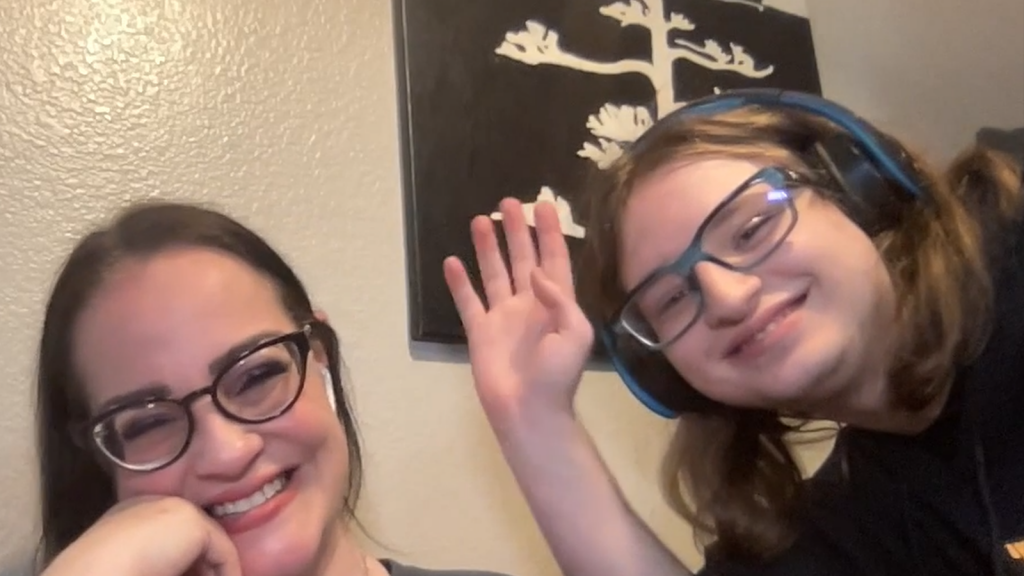
Bryce: surprise visit.
That’s, that’s Bryce.
Bryce: Speaking of the devil. ,
We didn’t call you a devil.
I, I might have. No.
No. She’s been nothing. Nothing but positive here.
We’ve talked a little bit about this, about, um, some of the misconceptions of, of parenting coming in without really calling it that, but what do you think that’s, what are some of the misconceptions that people have about parenting a medically fragile child?
That you have to do it all on your own? That, um, and that medical professionals are correct. Now, I’m not saying go to Web MD and diagnose a kid.
No, please don’t.
I’m not saying that at all.
Bryce: Oh yeah. That’ll work actually.
What I am saying is trust your intuition and, um, I don’t know what would’ve happened if I had just taken the diagnosis of, oh, his stomach just needs to be opened and he needs a feeding tube.
We’ve talked a lot about the trauma that you’ve gone through. The, just how you were giving all of yourself, but not taking care of yourself. Um, and you did not have the counseling that you, that you wish that you had had. Now, what did you learn about self-care and prioritizing yourself and what are you doing now or would you tell the next parent to do?
Yeah. Um, if you’re not okay, your kid’s not okay. I mean, it’s really simple. . It’s um, it’s really simple to say,
Not simple to do, but really, if you’re not okay, your kid’s not okay. Your marriage isn’t okay. Your partnerships aren’t okay, your relationships aren’t okay. Your physical body is not okay if you are not okay up here.
So if you’re not okay, your kid, nobody else is around you that counts on you, is going to be okay. So what does self-care look like, right? Self-care looks like stepping away from everybody and sitting just with yourself. Self-care looks like loving that inner child that is screaming to be noticed and seen and heard and validated, but it needs to come from you.
So self-care looks like giving yourself grace. Self-care looks like doing creative things. It looks like dancing. It looks like singing. It looks like music. It looks like twirling in circles, if that makes you happy. It looks like physical activity. , you’ve gotta keep your serotonin and your a dopamine levels up, especially your serotonin.
That comes from great gut biome. So take a fantastic probiotic. Eat fermented foods. Stay away from gluten as much as you can. Um, that looks like moving your body. I don’t care if it’s 10 minutes. I don’t care. Do something. Put on some booty shaken rap songs, booty Shake for 10 minutes a day. Um, because not only will that boost your serotonin, but it is some sort of physical activity to help your body stress relief.
Meditate if you can. If you don’t know how, ask somebody that you know does, um, breathing techniques. Let me teach you one right now. Super easy to do. You can do it at any point in time and nobody knows if you’re doing it. And, um, but it actually has been shown to bring down your cortisol levels. Bring down that sympathetic nervous system, the parasympathetic nervous system that’s.

Screaming at you. Bring down your blood pressure, bring it, bring it all down. It’s called box breathing. Super easy thing to do. It’s called a box because it’s four seconds in four seconds. Hold four seconds. Inhale. Exhale. Four seconds. Hold. So it’s just a box. So you breathe in through your nose and you’ll hold it.
And then when you exhale, I want you to do like you’ve got a straw and I want you to force it all out. So, and when you inhale, your belly should inhale first. That’s another thing. Most of us breathe in in stress situations, trauma situations. Most of us breathe with our chest.
True.
All right. So what is something positive that has come out of your experience as a parent of a medically fragile child?
Yeah, so here’s an amazing life transformation you guys. Um, if you can find a, something good out of a tragedy, . Um, you’re winning, you’re winning the game, truly. And it took me years.
Yes. I walk on eggshells a lot of the time because I worry about my son’s health again. Chickenpox could kill my son. And that’s scary.
That’s really scary. Um, but it also allows me to see the fragility of life and not take every day for granted and not live again the same day over and over and over and over again for years.

95% of the thoughts that you have were the same as yesterday and the same as the day before. And they’ll be the same tomorrow if you’re not mindful and pay attention to it. So I urge you just to break out of that cycle, do something different today than you did yesterday, and it’s amazing the growth that comes with that. Even something little like color. Get a kid’s, get a kid’s coloring book. Get an adult coloring book color. Reconnect with that inner child. Remember who you are at your core.
We’ve mentioned a little bit about your coaching and all. Tell me what exactly it is that you’re doing and how people can get in touch with you.
Um, so I help women 35-ish, you know, who secretly hate their life, um, who hate the person they’ve become, who find themselves yelling and resenting their loved ones when they love them so deeply, who don’t remember who they are at their core. They’re lost in all of the other labels and roles that they’ve taken on or have been given to them, and they’ve chosen to accept maybe unwittingly, unknowingly.
But you did. Um, and that was an epiphany for me. Um, I help them rediscover their life. I help them set healthy boundaries. I help them get back into the mind-body connection. Um, I actually have a technique called the Empowered Authenticity Technique. And it is, um, a culmination of breath work, um, of meditative practices, of inner knowing practice.
And, um, I help women make aligned decisions using that technique. Um, and those aligned decisions feel true. They feel powerful, and they feel okay to say yes to versus begrudging. Yes. Right? Mm-hmm. , I don’t want you to begrudgingly say yes ever again after working with me. . Um, I want you to be able to use your voice.
I want you to be able to honor yourself first, and not in a selfish way, um, but in a way that is empowering for you and your family. And so that’s, that’s what I have the honor and the privilege of doing now. Um, it’s a 12 week course. It’s an hour a week. Um, we get really honest, get really honest about where you are and how you’re contributing to your own and how to get out of it, how to get out of it.
Um, and so I am revamping my website right now, but you can go to afewshortminutescoaching.com. Um, and there’s my Calendly links in there. You can book a discovery call with me, a vision into action call. Uh, it is complimentary. Um, we can talk about if we’re a fit or not. And if we’re not a fit for whatever reason, if you don’t resonate with me, , that’s fine.
I’m not for everybody. Um, but I, I am surrounded by amazing coaches in my life who I could refer you to, and I have no problem doing that. Um, obviously I do have some specialties in like medically fragile children. Um, that doesn’t necessarily have to be you, but I get it if it is. Um, I really am looking to work with women who are just really lost, are just really lost in their life, really stuck.
Um, so my website, I’m @afewshortminutescoaching on Instagram, Stacey Short on Facebook. Um, also @afewshortminutescoaching on Facebook. I’m also on TikTok with Stacey coaches. Um, I’m on LinkedIn, Stacey Short, um, I’m wear wearing a red outfit throughout all of them.
With those that are listening, I’m gonna put in the show notes.
If you’re listening on, um, the audio or in the description, or if you’re watching the video, or if you’re on the website, it’ll be right there in front of you. But we’ll put in all of those, the links that she just shared so you can, can get to her website, to her Facebook, and, um, her other links there. And, um, do you want to mention your podcast that’s gonna be launching?
It will be called A Few Short Minutes. And the idea between A Few Short Minutes is it really, first of all, it’s my last name, so there’s that.
I noticed that .
But really what it’s about truly is it really just takes a few short minutes to recognize your thought patterns, to catch them. Um, it only takes a few, few minutes a day to be present, and then eventually you’ll expand that.
But I just want you to start small and, and, and I don’t want you to beat yourself up about it if you’re bad at it. Don’t even say that. Just I’m learning. Give yourself that grace. And so A Few Short Minutes is just kind of the basis of how we coach, of how I coach, and that is starting small and building because even small hinges still swing really big doors.
Stacey, thank you for joining us today. I really appreciate you opening up and, um, and even having a quick hello from your son too. Was kind of fun. But thank you for joining us today.
It’s absolutely my pleasure, Tonya. Thank you for having me and spending so much time with me.
I’ve really enjoyed, um, talking to you bantering, sharing my story. Um, it’s an honor. Thank you.
